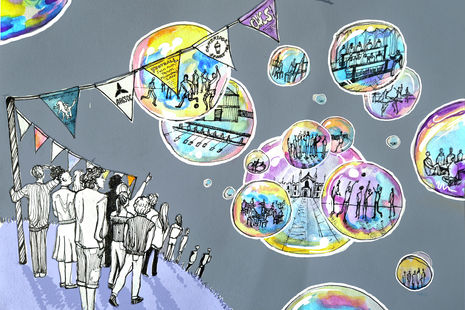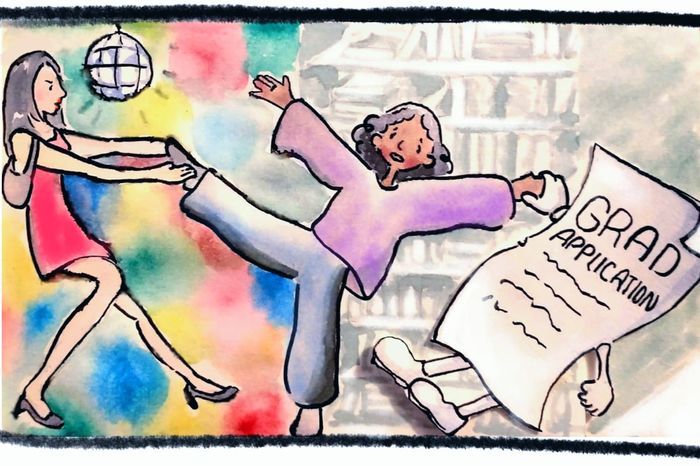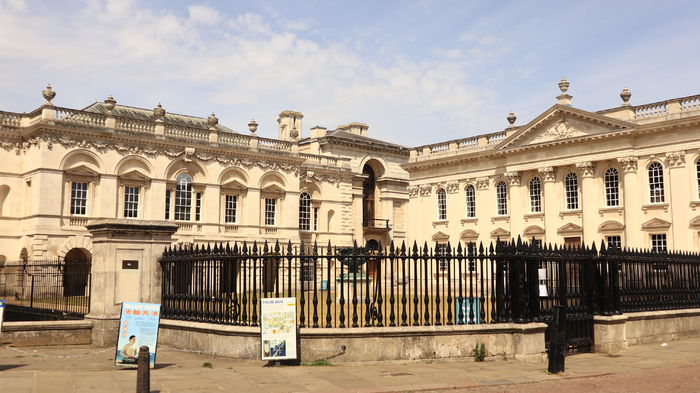Find people in Cambridge you disagree with
Daisy Stewart Henderson argues that one of the most important lessons we learn at Cambridge is how to disagree

Dear freshers: try not to find your tribe at Cambridge.
It sounds counterintuitive. After all, in some ways, Cambridge is a structurally tribal place. When I submitted my application, I didn’t really understand how distinct individual college cultures were, with many closely tied to political leanings, each fostering an ethos which shapes who chooses to apply, and who gets in. So suffice to say, it felt slightly ironic when I, as a girl from a left-leaning state school, realised that I had managed to end up at a college whose name is often associated with caricatures of very posh, very conservative men. And I have felt out of place. I spent a long time lamenting the fact that finding ‘my people’ at Cambridge seemed to be an impossible feat, until I reevaluated who those people actually were.
“Prepare to agree to disagree, and do so with both gumption and grace”
The thing that sets Cambridge apart, I think, is the fact that our education hinges on disagreement. When I speak to friends at other universities, one of the things that they always find most shocking, up there with Cambridge’s most fabled eccentricities, is the supervision system. Specifically, it’s the fact that we spend hours writing essays about things we don’t know that much about, only to have our arguments picked (or sometimes torn) apart by academics.
And for all our flaws, I think this comfort with, and indeed the value which is ascribed to disagreement, is one of the best things about our university. At both ends of the political spectrum, we have seen an alarming rise in intolerance of those who we see as misaligned with ourselves. Obviously, social media only exacerbates this, particularly when acts of hatred and political violence appear on our feeds as regularly as funny videos of cats. But I think in day-to-day life, too, we have become deeply uncomfortable with disagreement. Before coming to Cambridge, I was a member of a youth parliament, which was designed to amplify young voices. Yet in my first supervision at Cambridge, and in early conversations with my peers, I had to unlearn a lot of the habits I had picked up there. I kept searching for the ‘right’ opinion for a particular audience, the elusive perspective that I assumed would be the one which Cambridge academics would reward. In short, I had to learn how to disagree.
“In your first few days at Cambridge, don’t just look for ‘your people’”
And it has probably been the most important lesson I’ve learned here. At risk of sounding a bit like that infamous Rishi Sunak interview, I think I really do have friends from a wide range of backgrounds, representing a wide range of beliefs. Two years into my degree, I haven’t found very many people who are especially ‘like me’. But rather than finding a tribe, I have discovered whole worlds that were alien to me before coming to university.
A lot of my best essays have been ones that my supervisors respectfully disagreed with. I’ve come to realise that the discussions which have emerged from them are far more educational than an instant consensus would’ve been, and that the areas of my subject which I enjoy the most aren’t actually the ones I pigeonholed myself into at 17. I’ve heard thoroughly objectionable views debated at the Cambridge Union, and among my peers, and have gained clarity on my values through disagreement and open-mindedness to the nuggets of similarity that crop up in what would appear to be wholly contrasting stances. I’ve edited articles for Varsity which completely oppose my own interpretation of a situation, while thoroughly respecting the writers’ thoughtfulness and passion in the process. I’ve listened to hours’ worth of theological discussions between people of different religious views, and started going to church regularly as an atheist, reminding me that the very facts of the universe with which I was raised aren’t, well, taken as gospel by everyone. And I’ve come to feel a greater sense of belonging at my seemingly antithetical college than I have anywhere before.
So, when you’re at freshers’ fair, or scanning your college’s dining hall trying to identify targets for friendship, in your first few days at Cambridge, don’t just look for ‘your people’. In an ever-more polarised world, we are uniquely fortunate in being trained, by some of the very brightest minds in our fields, to disagree. So prepare to agree to disagree, and do so with both gumption and grace. And if you haven’t just arrived in Cambridge, try to do something new regardless. Try something which makes you a little bit uncomfortable, or humour your deepest, darkest, most contrarian instincts. In the process, you may discover that ‘your people’ are a rather more eclectic, more exciting bunch than you had ever imagined.
 News / Colleges charge different rents for the same Castle Street accommodation2 March 2026
News / Colleges charge different rents for the same Castle Street accommodation2 March 2026 News / News in Brief: waterworks, wine woes, and workplace wins 1 March 2026
News / News in Brief: waterworks, wine woes, and workplace wins 1 March 2026 News / Climate activists protest for ‘ethical careers policy’1 March 2026
News / Climate activists protest for ‘ethical careers policy’1 March 2026 News / Angela Merkel among Cambridge honorary degree nominees27 February 2026
News / Angela Merkel among Cambridge honorary degree nominees27 February 2026 News / Private school teacher who lied about Cambridge degree barred from teaching27 February 2026
News / Private school teacher who lied about Cambridge degree barred from teaching27 February 2026










